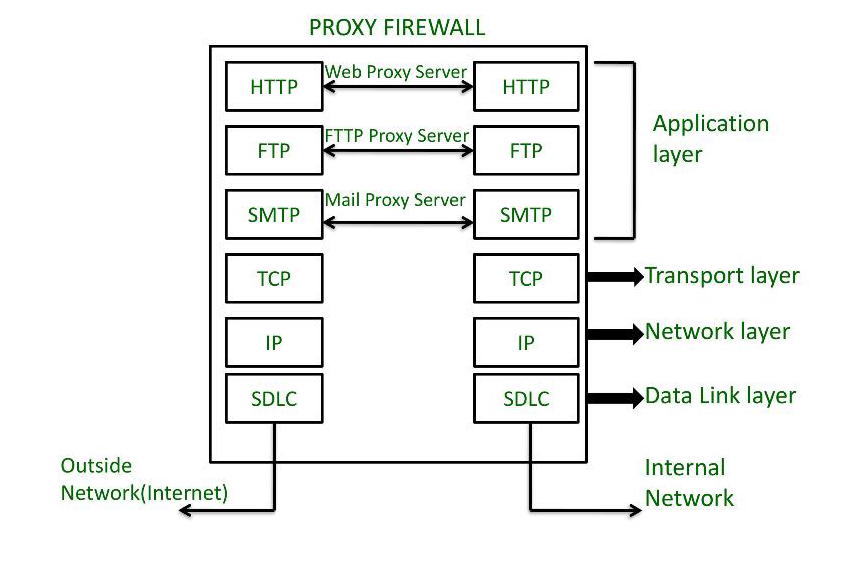What is a Proxy Firewall?
Last Updated :
10 Sep, 2021
Prerequisite : Introduction of Firewall
Introduction :
A firewall proxy provides security by controlling the information going in and out of the network. Firewall proxy servers filter, cache, log, and control requests coming from a client to keep the network secure and free of intruders and viruses. Proxy firewall has its own IP (internet protocol) address so that internal network never makes a direct connection with outside internet. Since it monitors information at the application level, it is also known as application firewall.
How proxy firewall handles requests from the internal network :
- The proxy firewall acts as intermediary between trusted internal network and outside internet.
- If computers in internal network wish to make a connection with outside internet, they first communicate with the proxy.
- Proxy then forwards data from internal network to the internet and sends data received from internet to internal network.
- In this way the proxy firewall shields internal network from intruders in the outside internet and prevents direct connections between internal network and internet.
Advantages :
- Compared to packet-oriented firewalls, proxy firewall analyses the data traffic for the supported protocols in a much more detailed manner.
- Proxy Firewalls are most secure types of firewalls, because they work at the application level.
- The main advantage of proxy firewalls is that with the help of proxy server firewalls it enables users to browse the Internet in a private manner, allowing them to keep their personal information and browsing habits private.
- Because of its good caching structure, proxy servers are frequently used to speed up browsing and data access.
Disadvantages :
- Proxy firewalls are very safe, but they sacrifice functionality by restricting which apps your network can handle.
- The proxy-based firewalls are not compatible with all protocols.
- Another major drawback of proxy firewalls is latency, at the time of heavy traffic . Latency is delay in response that user experiences when trying to access information from the outside internet network.
Proxy Firewall as an Application Firewall :

- As mentioned earlier, proxy firewall monitors information at the application layer with the help of firewall proxy servers. proxy firewall servers create and run processes on the firewall that mirrors a service as it were running on the end host.
- At the application layer , there are several protocols such as: HTTP(protocol for sending and receiving web pages), SMTP(protocol for email messages on the internet). Proxy Servers such as Web Proxy Server is like a process that mirrors the working of a HTTP service. Similarly, FTP Proxy Server mirrors working of FTP service.
- To avoid direct contact between internal network and untrusted outside network proxy servers convert two party session into a four party session. Internal network then, reaches out to servers with a request , the request is then forwarded by proxy server on the client side to proxy server on the internet server side which then forwards it to the outside network. This is the basis of all the network security provided by proxy firewalls.
Comparison between proxy firewall and tradition firewall :
- Traditional firewall mainly provides stateful inspection of incoming and outgoing network traffic entering or exiting inside network. Proxy firewalls go a step further than stateful inspection firewalls by not allowing any packets to travel directly between protected systems.
- On the destination network, the firewall establishes a proxy connection and then routes traffic via it. No such proxy connection is created in case of tradition firewall.
- Proxy Firewall mainly works on the application layer whereas, Traditional Firewall works on the transport and network layer of the TCP model.
- Proxy Firewalls are much more expensive than Tradition Firewalls and are normally only used to protect data centers and high-value servers.
- Traditional firewall is old firewall security system. Proxy firewall is advanced firewall security system.
Like Article
Suggest improvement
Share your thoughts in the comments
Please Login to comment...